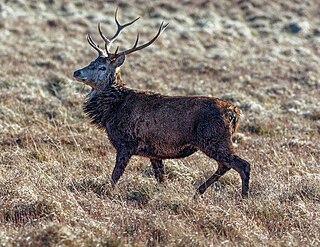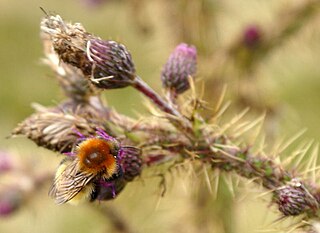Derbyshire Wildlife Trust is one of 46 local Wildlife Trusts around the UK working to promote and protect local wildlife. It covers the whole of Derbyshire and was founded in 1962 in response to environmental threats to the local countryside, since when it has continued to grow. The trust is now based at East Mill on the River Derwent in the town of Belper, Derbyshire. It is a registered charity, supported by more than 14,000 members and over 500 volunteers.

A bumblebee is any of over 250 species in the genus Bombus, part of Apidae, one of the bee families. This genus is the only extant group in the tribe Bombini, though a few extinct related genera are known from fossils. They are found primarily in higher altitudes or latitudes in the Northern Hemisphere, although they are also found in South America, where a few lowland tropical species have been identified. European bumblebees have also been introduced to New Zealand and Tasmania. Female bumblebees can sting repeatedly, but generally ignore humans and other animals.

Durham Wildlife Trust is a registered charity that was established in 1971, originally as the Durham County Conservation Trust, becoming Durham Wildlife Trust in 1988. The Trust operates across the area of the old County Durham, which includes Darlington, Gateshead, South Tyneside and Sunderland.

The National Lottery Community Fund, legally named the Big Lottery Fund, is a non-departmental public body responsible for distributing funds raised by the National Lottery for "good causes".

Buglife – The Invertebrate Conservation Trust is a UK-based nature conservation charity.

RSPB Dearne Valley Old Moor is an 89-hectare (220-acre) wetlands nature reserve in the Dearne Valley near Barnsley, South Yorkshire, run by the Royal Society for the Protection of Birds (RSPB). It lies on the junction of the A633 and A6195 roads and is bordered by the Trans Pennine Trail long-distance path. Following the end of coal mining locally, the Dearne Valley had become a derelict post-industrial area, and the removal of soil to cover an adjacent polluted site enabled the creation of the wetlands at Old Moor.

Plantlife is a wild plant conservation charity. As of 2023, it manages 24 nature reserves around the United Kingdom. HM King Charles III is patron of the charity.

The fauna of Scotland is generally typical of the northwest European part of the Palearctic realm, although several of the country's larger mammals were hunted to extinction in historic times and human activity has also led to various species of wildlife being introduced. Scotland's diverse temperate environments support 62 species of wild mammals, including a population of wild cats, important numbers of grey and harbour seals and the most northerly colony of bottlenose dolphins in the world.
Wildwood Trust is a woodland discovery park in Herne, near Canterbury in Kent, England. It features over fifty species of native British animals such as deer, badgers, wild boar, wolves and brown bear. It is located on the main road A291 between Herne Bay and Canterbury.

The early bumblebee or early-nesting bumblebee is a small bumblebee with a wide distribution in most of Europe and parts of Asia. It is very commonly found in the UK and emerges to begin its colony cycle as soon as February which is earlier than most other species, hence its common name. There is even some evidence that the early bumblebee may be able to go through two colony cycles in a year. Like other bumblebees, Bombus pratorum lives in colonies with queen and worker castes. Bombus pratorum queens use aggressive behavior rather than pheromones to maintain dominance over the workers.

The broken-belted bumblebee or Ilfracombe bumblebee is a species of bumblebee present in most of Europe and parts of Asia.

The short-haired bumblebee, or short-haired humble-bee, is a species of bumblebee found in Eurasia, as well as in New Zealand, where it is an introduced species.

Franklin's bumblebee is one of the most narrowly distributed bumblebee species, making it a critically endangered bee of the western United States. It lives only in a 190-by-70-mile area in southern Oregon and northern California, between the Coast and Sierra-Cascade mountain ranges. It was last seen in 2006. Franklin's bumblebee collects nectar and pollen from several wildflowers, such as lupine, California poppy, and horsemint, which causes it to be classified as a generalist forager.

Bombus muscorum, commonly known as the large carder bee or moss carder bee, is a species of bumblebee in the family Apidae. The species is found throughout Eurasia in fragmented populations, but is most commonly found in the British Isles. B. muscorum is a eusocial insect. The queen is monandrous, mating with only one male after leaving a mature nest to found its own. Males mate territorially and the species is susceptible to inbreeding and bottlenecks. The species builds its nests on or just under the ground in open grassland and forages very close to the nest. In recent years, populations have significantly declined due to loss of natural habitat. B. muscorum is currently listed as vulnerable in Europe by the European Red List of Bees.

The Montrose Air Station Heritage Centre is located to the north of Montrose, Angus, Scotland. Montrose has the distinction of having the first operational military airfield in Great Britain and the Heritage Centre is located on the former airfield.

Peoples Trust for Endangered Species (PTES) is a charitable organisation registered in England and Wales. It exists to promote the conservation of rare or declining species and habitats in the UK and worldwide through monitoring, public engagement, education, and through the funding of conservation projects and research. It also owns and manages two nature reserves. As of April 2015, PTES has 16 employees, five trustees and coordinates around 24,000 volunteers in the UK. PTES relies on donations from the general public and grants from trusts and foundations to continue its work - it receives no core funding from the UK Government. The organisation has registered charity number 274206.

Dave Goulson is Professor of Biology at the University of Sussex. Specializing in the ecology and conservation of insects, particularly bumblebees, Goulson is the author of several books, including Bumblebees: Their Behaviour and Ecology (2003), Silent Earth: Averting the Insect Apocalypse (2021), and more than 200 academic articles. In 2006 he founded the Bumblebee Conservation Trust, a charity that aims to reverse the decline in the bumblebee population.
SongBird Survival (SBS) is an independent, UK-wide, environmental bird charity that funds research into the decline in Britain's songbirds. It is a not-for-profit organisation supported by grants, subscriptions and donations, and a registered charity and company.

Anthophora retusa, the potter flower bee, is a species of solitary digger bee.

The Irish Bee Conservation Project is a charitable organisation in Ireland that seeks to conserve all native Irish bee species. It has four "pillars of support" in its work: providing habitats, increasing biodiversity, holding education events and performing research into the decline of bee species. Species of bee in Ireland include the honeybee, 21 species of bumblebee and 78 species of solitary bee.



















